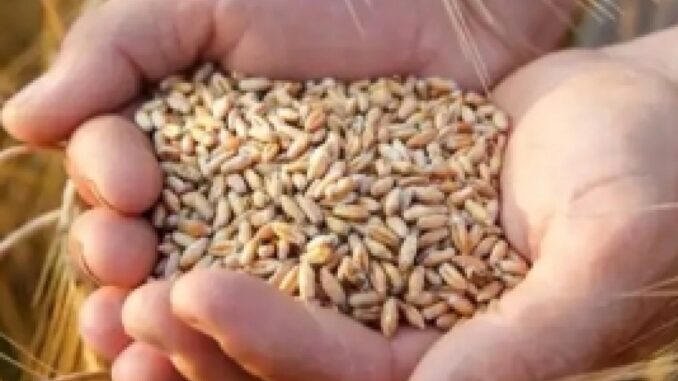
New Delhi, Feb 16 (IANS) Farmer unions in Punjab are accusing the Central government of doing injustice to them, however, official data has revealed that the present regime has provided financial assistance to the farming community more than ever.
According to the official data, in 2013-14, the budget allocation for the Agriculture and Farmers’ Welfare Ministry was Rs 27,662.67 crore. This has been increased to Rs 1,25,035.79 crore in 2023-2024. The food grain production has also increased from 265.05 million tonnes in 2013-14 to a record 329.69 million tonnes in 2022-23, which is the highest-ever food grain production.
The horticulture production was 351.92 million tonnes in 2022-23 which is also the highest ever (as per second advance estimates).
The data showed that the Agri and allied exports have increased from $50.24 billion in 2021-22 to $53.15 billion in 2022-23 which is an increase of 5.8 per cent.
The government has also increased the minimum support price (MSP) for all mandated Kharif, Rabi and other commercial crops with a return of at least 50 per cent overall India weighted average cost of production, each year, since 2018-19.
Similarly, the MSP for Paddy (common) has increased from Rs 1345 per quintal in 2013-14 to Rs 2203 per quintal in 2023-24. The MSP for Wheat increased from Rs 1350 per quintal in 2013-14 to Rs 2125 per quintal in 2023-24.
The figures also showed that since 2018-19, 115.32 LMT of pulses have been procured under the Price Support Scheme (PSS) having the MSP value of Rs 63,034.55 crore paid to 63,11,631 farmers. Since 2018-19, 51.75 LMT of oilseeds have been procured under the PSS having the MSP value of Rs 26,328.41 crore benefitting 23,55,876 farmers.
Further, during the Khairf 2023-24 season, 2,29,382.92 MT of oilseeds, pulses and copra have been procured till date from 1,37,957 farmers having the MSP value of Rs 2,228.55 crore.
Since 2018-19, a quantity of 44.77 LMT was sanctioned for implementation of the Market Intervention Scheme (MIS) for procurement of perishable agricultural and horticultural commodities such as apple, potato, onion, garlic, mango and turmeric. As many as 5,679.7 lakh farmer applications have been insured under the scheme from 2016-17 till 2023-24.
A total of Rs 1,55,977 crore has been paid as the claim against the farmers’ premium of Rs 31,139 crore, the data showed.
Since 2018-19, Rs 2.81 lakh crores have been transferred through Direct Benefit Transfer (DBT) to more than 11 crores farmers through various instalments. Since 2018-19, Rs 8,92,993 crore has been paid out as fertilizer subsidy with a total sold quantity of 3725 LMT.
Institutional credit for the agriculture sector is increased from Rs 7.3 lakh crore in 2013-14 to Rs 20.39 lakh crore in 2023-24 (till 31.01.2024) for 1,268.51 lakh accounts.
The benefit of concessional institutional credit through Kisan Credit Card (KCC) at 4 per cent interest per annum has also now been extended to Animal Husbandry and Fisheries farmers for meeting their short-term working capital needs. As of March 31, 2023, there were 73,470,282 operative KCC accounts with an outstanding amount of Rs 8,85,463 crore, revealed the figures.
During the period from 2014-15 to December 2023, an amount of Rs 6,405.55 crore has been allocated for agricultural mechanization. As many as 15,23,650 units of machines and equipment have been provided to farmers on subsidy. So far, 7,960 Farmer Producer Organisations (FPOs) have been registered under the scheme with an equity grant of Rs 145.1 crore released to 3187 FPOs.
A new Central Sector Scheme was also launched in 2024 in which financial assistance at 80 per cent of the cost of drone and accessories charges up to a maximum of Rs 8 lakh will be provided to 15,000 women Self Help Groups (SHGs) for purchase of drones.
Since the inception of the National Agriculture Market or eNAM, 1389 ‘mandis’ of 23 states and 4 Union Territories have been integrated with the platform and more than 1.77 crore farmers and 2.53 lakh traders have been registered. Under the Rashtriya Krishi Vikas Yojana (RKVY) Agri-startup Programme, since 2019-20, 1,524 start-ups have been selected and Rs 106.25 crore has been released as grants-in-aid for funding these start-ups.
Since the declaration of the International Year of Millets (IYM) 2023 by the UNGA in 2021, the government has taken a proactive multi-stakeholder engagement approach to achieve the aim of IYM 2023 and taking Indian millets globally. The government has also promoted Pension Schemes for farmers and agricultural labourers.
Since 2014, the government has taken several initiatives such as Pradhan Mantri Kisan Maandhan Yojana (PM-KMY), and Pradhan Mantri Shram Yogi Maandhan Yojana (PM-SYM), amongst others, to ensure old age protection to the farmers and agricultural labourers of the country.
Over 36 lakh farmers and agricultural labourers are registered in the PM-KMY (23 lakh) and PM-SYM scheme (13 lakh), the data revealed.
–IANS
gcb/sha
Leave a Reply